The Russian president still cannot get over the collapse of the USSR. We see the effects just beyond our eastern border. To understand today's war in Donbas, one has to go back in time to the last days of the Soviet empire.
March 18, 2014. Vladimir Putin gives a speech on the occasion of the annexation of Crimea. His words capture the hearts of thousands of Russians:
The USSR has fallen apart. (...) And when Crimea suddenly found itself in another country, Russia felt that it was not only robbed but also robbed. (...) And the Russian state, what about it? Come on, Russia? You lowered your head, accepted it, and swallowed the shame.
It was clear to the audience that Russia was now ready to wipe out that disgrace, and the first step was to regain the "stolen" peninsula. But who was the perpetrator of this humiliation nearly a quarter of a century ago? The answer may seem surprising.
Recent "evil empire" convulsions
On the night of August 18-19, 1991, a coup d'état took place in Moscow. The hard-line communists were no longer going to tolerate progressive democratization. Equally unacceptable for them was the gradual loss of the Kremlin's control over individual republics of the union, which were increasingly striving for independence.
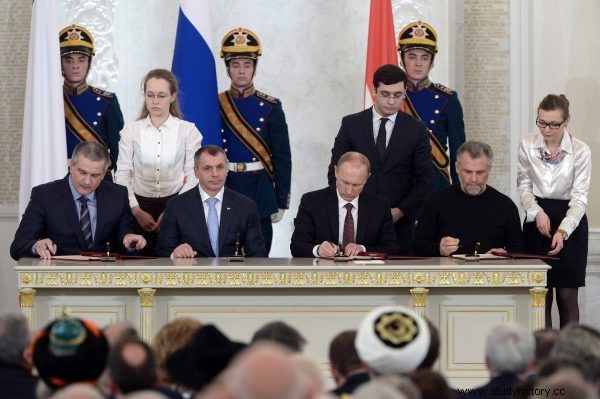
Vladimir Putin and representatives of the Autonomous Republic of Crimea sign the treaty on the annexation of Crimea to Russia (photo:Kremlin.ru, CC BY 3.0).
Poorly prepared and ineptly carried out, the coup led by Gennady Janjew broke down after a few days. Its effects were counterproductive. The central government of the USSR, personified by Mikhail Gorbachev, was marginalized and the disintegration of the empire was getting closer.
The most important person in the country was Boris Yeltsin - the president of Russia, the largest union republic. The further development of events was to be determined by the relations between individual republics, bypassing the superior state organs of the Land of the Soviets. The relationship between Kyiv and Moscow turned out to be crucial . And these just gained a lot of acceleration.
Ukrainian ambitions - Russian nightmare
On August 24, just three days after the end of the Moscow coup, the parliament of the Ukrainian Soviet Socialist Republic declared independence. The implementation of this declaration was conditional on the result of the referendum scheduled for December 1.
On the same day, Yeltsin recognized the independence of the Baltic states, but he did not intend to do anything similar with Ukraine! On the contrary, his press secretary read to journalists a statement in which the government in Kiev was almost threatened with border revision.
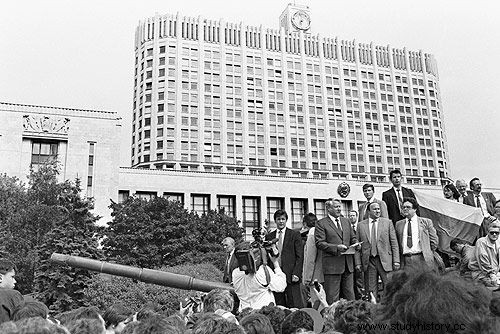
Boris Yeltsin speaks to the crowd on a tank standing in front of the seat of the Russian parliament, the so-called The White House, August 19, 1991. This event became a symbol of the fight against the Janyev putschists (photo:Kremlin.ru, CC BY 3.0).
Why such a harsh position? Now that the Russian president had won the rivalry with Gorbachev, it was in his best interest to stop the disintegration of the Soviet Union. Serhii Plokha explains in the book "The Last Empire" that Yeltsin and his advisers were not ready for the fall of more republics "either mentally or politically".
They accepted the loss of the Baltic states, hoped that the Central Asian republics would stop demanding subsidies from the center, but no one in Yeltsin's entourage even thought that they could lose Slavic Ukraine - it was a nightmare scenario.
Referendal knockout
Yeltsin's initial threats turned out to be empty words, and as soon as two days later they began to be withdrawn. The Russians tried to persuade Ukrainians to remain in a relationship with Russia and other republics: You Ukrainians, do not even think about breaking away from Russia: we are one after all - said the mayor of Leningrad, Anatoly Sobchak.
In Kiev, nobody wanted to hear about it. The decisive role was played by the ambitious communist apparatchik Łeonid Kravchuk, who dreamed of the presidency of independent Ukraine obtained in democratic elections. They were to take place along with the independence referendum. When the leaders of the republics were negotiating a new union treaty in November, Kravchuk did not even come to the talks.
The results of the December referendum surprised everyone. 90.32% of voters were in favor of independence with a turnout of 84%. Even in Crimea, Odessa and Donbas, the supporters of full independence prevailed. Kravchuk won the presidential election and it suddenly turned out that the Soviet Union was at his mercy and disfavor.
Read also: Budapest Memorandum. Ukraine's biggest mistake after 1991?
Krawczuk dictates the conditions
In the new situation, Krawczuk and Jelcyn met on December 7 in Wiskula in the Białowieża Forest. The host was Stanislau Szuszkiewicz, chairman of the Supreme Council of the Byelorussian SSR, and therefore the head of this country. The leaders of the founding countries of the USSR intended to decide on its further fate.
Yeltsin brought with him the proposals that had been worked out in November in Novo-Ogarivsk. They assumed the establishment of a confederation of states without a common constitution, but with one president elected in general elections. Krawczuk, however, rejected the union treaty in any form and refused to talk about mutual integration. He argued Yeltsin:
Who will you be when you come back to Russia? I will return to myself as the president elected by society, and what will your role be - Gorbachev's subordinate, as before?
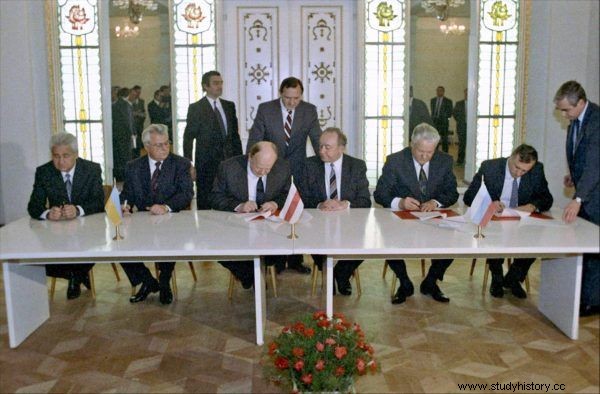
The leaders of the Russian, Ukrainian and Belarusian SSR sign an agreement on the dissolution of the Soviet Union and the creation of the Commonwealth of Independent States (photo:RIA Novosti archive, image # 848095 / U. Ivanov / CC-BY-SA 3.0).
Eventually, a different form of agreement was sought. Russian and Belarusian experts spent the night working on a new document on the establishment of the Community of Democratic States. In the morning, the Ukrainians suggested that the name should be changed to the Commonwealth of Independent States, and it seemed that the only thing left for a moment was to sign it. However, Krawczuk again had a different opinion.
The Ukrainian president acted as if there was no draft, grabbed a pen, a piece of paper and announced that he would write the agreement himself , during direct negotiations with Jelcyn and Szuszkiewicz. Within a few hours, it was decided to dissolve the USSR and establish the CIS, whose members declared political, economic and cultural cooperation. There were no concrete details.
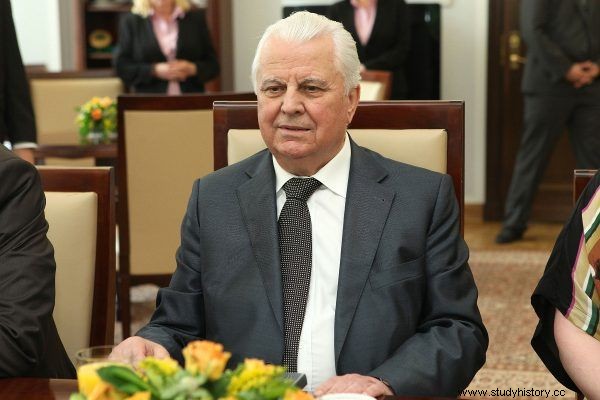
Łeonid Krawczuk, perhaps unexpectedly for himself, became one of the main perpetrators of the collapse of the USSR (photo:Michał Józefaciuk, Senate of the Republic of Poland, CC BY-SA 3.0 PL).
On December 21, 1991 in Almaty, Kazakhstan, Kyrgyzstan, Moldova, Turkmenistan, Uzbekistan, Tajikistan, Armenia and Azerbaijan also joined the Community. A Council of Presidents and a Council of Prime Ministers were established, but they were only to play "coordinating" functions. And this time Krawczuk did not allow any organs of the central government to be created or one nationality for all republics.
Necessary Ukraine
But why did Yeltsin and the leaders of the other republics humbly yield to the stubbornness of the Ukrainians? Even if they could not be compelled to submit, why were they not ignored? The reasons are explained by the already mentioned Serhii Plokha:
Neither Gorbachev nor Yeltsin could imagine a Union without Ukraine. It was the second most populous and richest republic after Russia. The Russian leadership, already reluctant to lay down on the empire before, certainly did not intend to maintain it without Ukraine's help . Besides (...) Russia needed Slavic Ukraine as a counterweight to the Central Asian republics.
The existence of the union was not possible without the participation of Russia, and for it the accession of Ukraine was necessary. In Moscow, however, it was assumed that the CIS was only a temporary solution for about 20 years. After that time, the rebuilt economic and political power of the Federation was to make the former USSR states return to their motherland themselves.
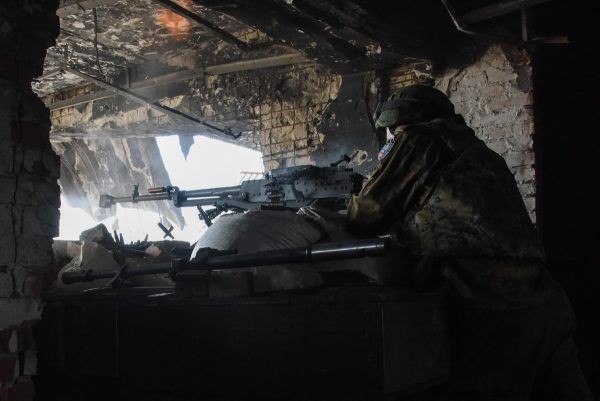
A soldier of pro-Russian separatists at a post in the ruins of the airport in Donetsk (photo:Mstyslav Chernov, CC BY-SA 4.0).
A form of implementing these plans is the creation of the Eurasian Economic Union in 2014, which is to be an alternative to the European Union. And just like in 1991, now the Russian authorities recognized that the new form of reintegration would not be a success if Ukraine did not participate in it. This is why Ukraine's plans to associate with the EU and the events at Kiev's Maidan met with such a drastic reaction from Putin.
In the early 1990s, Russia found the empire too expensive, and it is still so today. Putin is therefore somewhat honest when he denies that he is trying to rebuild it. However, it forgets to add that Moscow simply found cheaper and slightly less effective ways to control the "near abroad" as the entire post-Soviet area is called.
Source:
Serhii Plokhy, The Last Empire. Fall Story the Soviet Union , Znak Horyzont, Krakow 2015.
